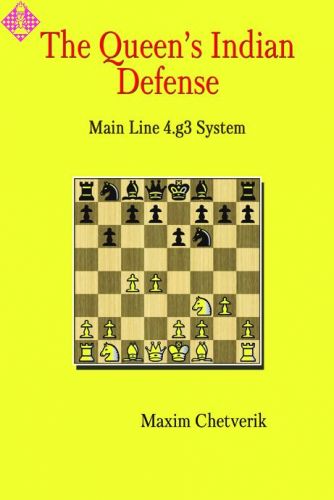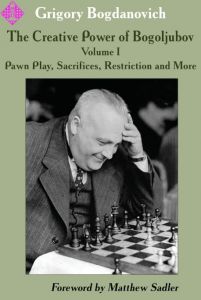The Queen’s Indian Defense
418 Seiten, kartoniert, Elk and Ruby, 1. Auflage 2018
International Master Maxim Chetverik has written an in-depth study of one of the most popular choices by white in the Queen’s Indian Defense – the main line with 4.g3, where white fianchettoes his bishop. This line is often seen at top-level chess.
A key focus of this work is an examination of new lines that have recently appeared in the arsenal of grandmasters. The full range of continuations for both white and black are covered in this textbook, including hybrids with the Bogo-Indian Defense and certain Catalan, Dutch, Benoni and Hedgehog-type set-ups, as well as key themes such as hanging pawns, the isolated queen’s pawn, white’s four versus three ranks advantage, the closed center with the pawn structure being c4\'ac-d5-\'ace4 against c5(c7)-\'acd6\'ac-e5 and structures with semi-open files, making it an essential and comprehensive guide for players on both sides of the board in this variation.
Maxim makes this book particularly user-friendly by his focus on learning the key ideas through practical games, as well as his use of “land-mines”, transposition alerts and key tips.
This book contains 181 full games in this line and several hundred fragments with detailed and original commentary by the author focused throughout on giving a balanced evaluation in what are complicated positions. Many of these games feature the world’s greatest players, including world champions Carlsen, Anand, Kramnik, Kasparov, Karpov, Spassky, Petrosian, Tal, Smyslov, Botvinnik and Alekhine, and other top players including Caruana, Shankland, Nakamura, So, Mamedyarov, Aronian, Grischuk, Ivanchuk, Karjakin, Harikrishna, Adams, Shirov, Gelfand, Topalov, Korchnoi and Timman.
Maxim himself has played over 100 official games in this line, making him a leading expert in the Queen’s Indian Defense in general and the 4.g3 line in particular. Four of his games are in included in full in this volume, as well as a number of fragments.
Maxim Chetverik , born in Voronezh in 1963, is one of Russia's biggest opening experts. He has written books published in Russian, English, French and German on the Catalan Opening, English Opening, Benoni System, Queen's Gambit Accepted, Sicilian Defense, Petroff Defense,
Dutch Defense, Alekhine Defense and Albin Counter Gambit, as well as more general opening books and books on the games of Alekhine, Tal and Spassky.
He became an International Master in 2003 and is a regular tournament player to this day, as well as being a coach in his native Voronezh. His best tournament results include Budapest Open, 1st place, 1996, Open championship of Slovan Club, Bratislava, 1st place, 1998, Prague Open, 2nd equal, 2002, Kecskemet (Hungary) round robin tournament, 1st place,
2003, Stuttgart Open, 2nd place, 2009, Yaroslavl Open, 3rd place, 2015, and Olomouc (Czech Republic), 2nd place, 2017.
| Gewicht | 660 g |
|---|---|
| Hersteller | Elk and Ruby |
| Breite | 15,6 cm |
| Höhe | 23,4 cm |
| Medium | Buch |
| Erscheinungsjahr | 2018 |
| Autor | Maxim Chetverik |
| Sprache | Englisch |
| Auflage | 1 |
| ISBN-13 | 978-5604176917 |
| Seiten | 418 |
| Einband | kartoniert |
005 A HISTORICAL FOREWORD
015 PART I. The system with 4.g3 Ba6
015 Introduction
016 Chapter 1. 5.Qb3 variation
037 Chapter 2. 5.Nbd2 variation
063 Chapter 3. 5.Qc2 variation
089 Chapter 4. 5.Qa4 variation
121 Chapter 5. 5.b3 b5 variation
131 Chapter 6. 5.b3 d5 variation
139 Chapter 7. 5.b3 Bb7 variation
148 Chapter 8. 5.b3 Bb4+ variation
185 PART II. Bogo-Indian hybrid lines
185 Introduction
186 Chapter 9. 4.g3 Bb4+ variation
200 Chapter 10. 4.g3 Bb7 5.Bg2 Bb4+ 6.Nbd2 variation
215 Chapter 11. 4.g3 Bb7 5.Bg2 Bb4+ 6.Bd2 Be7 variation
223 Chapter 12. 4.g3 Bb7 5.Bg2 Bb4+ 6.Bd2 Bxd2+ variation
233 PART III. The system with 4.g3 Bb7
233 Introduction
235 Chapter 13. Miscellaneous after 5.Bg2
247 Chapter 14. 5.Bg2 c5 variation
258 Chapter 15. 5.Bg2 d5 variation
266 Chapter 16. 5.Bg2 Bb7 6.Nc3 0-0 variation
277 Chapter 17. Opocensky Variation
308 Chapter 18. Miscellaneous on move 7
318 Chapter 19. 7.d5 variation
332 Chapter 20. 7.Re1 variation
351 Chapter 21. 7.Nc3 Ba6 variation
362 Chapter 22. 7.Nc3 d5 variation
382 Chapter 23. 7.Nc3 Ne4 8.Nxe4 Bxe4 variation
388 Chapter 24. 7.Nc3 Ne4 8.Qc2 variation
414 Conclusion
415 Players’ index
-
 One Rook Saves the Day16,95 €
One Rook Saves the Day16,95 € -
 Two Bishops Save the Day16,95 €
Two Bishops Save the Day16,95 € -
 Oleg Pervakov's Endgame Studies16,95 €
Oleg Pervakov's Endgame Studies16,95 € - Mehr von Elk and Ruby





